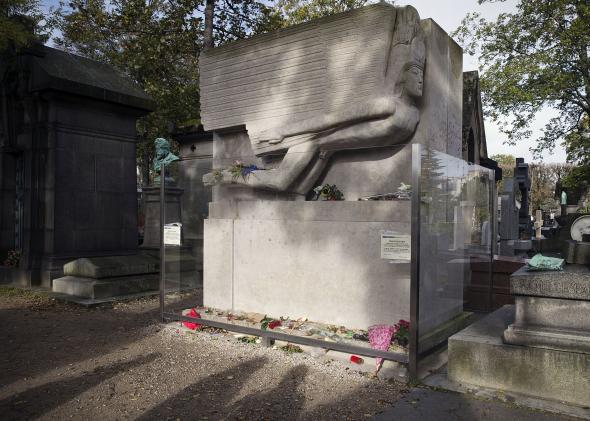When Oscar Wilde traveled through the United States in 1882, he entered a country that found his aesthetic sensibilities and queer (in its original meaning) style somewhat alluring but also vexing. While the lecture tour generated praise from some quarters, many critics were less intrigued: A man like Wilde “can hardly succeed in this country,” The Nation warned at the time. Fast-forward to 2015, and it would seem that the venerable magazine got it wrong. Indeed, far from failing, Wilde is actually enjoying a bit of a fad on this side of the ocean, thanks to the efforts of a number of cultural institutions to present exhibitions and productions about his life.
On the archival side of things, Philadelphia’s Rosenbach Museum, part of the Free Library of Philadelphia, is currently showing a range of Wilde documents and ephemera, including a number of unpublished items. The exhibition, called “Everything Is Going On Brilliantly: Oscar Wilde and Philadelphia,” “focuses on the life and work of Oscar Wilde, and highlights his historic and ongoing connections and influence in Philadelphia,” where he spent time during that 1882 tour.
The City of Brotherly Love also hosted a recent run of the new opera Oscar, with music by Theodore Morrison and libretto by Morrison and John Cox, which focuses on Wilde’s infamous trial, conviction, and prison sentence for “gross indecency” after his affair with Lord Alfred Douglas became a scandal in Britain. The piece was premiered in Santa Fe in 2013, but this Opera Philadelphia run, starring countertenor David Daniels in the title role, represented the East Coast debut of the work. Philadelphia Inquirer music critic David Patrick Stearns didn’t love the show overall, but he did praise the second act, which concerns Wilde’s post-trial sojourn: “Once Wilde is in prison, operatic conflict is abundant, mostly in the psychological brutality projected by the metallic edges of Morrison’s knotty though predominantly tonal score: Wilde, the master of artifice, suddenly hasn’t the slightest control over his external life. You do feel his pain.”
But perhaps the most fascinating of the recent Wildean revival was a recent run of John Gay’s rarely seen play Diversions & Delights, realized with impressive economy by the Ensemble Theatre Company of New York under director Kevin G. Shinnick. Veteran actor Craig Dudley played the title role in the one-man show, which takes the form of a fictional “Night with Sebastian Melmouth” (Wilde’s pseudonym) in Paris in 1899. In the first act, Wilde regaled the audience with a rhapsody of wit on art, social conventions, and yes, America, while sipping absinthe, the script incorporating aphorisms and quips that will be familiar to any Wilde fan. The second act went darker, with Dudley’s Wilde succumbing to a kind of stagey PTSD over the horrors of his prison experience and his betrayal at the hands of his ex-lover “Bosie,” Lord Alfred Douglas.
While I might have preferred a more seething portrayal to Shinnick’s histrionic vision of a Wilde in decline, his point—indeed, the point of all of these offerings—is well-taken: Wilde was a brilliant man and queer forefather broken by a hypocritical age; and, in our moment of relative social acceptance for queer people, his work and struggle deserve to be celebrated and remembered.
